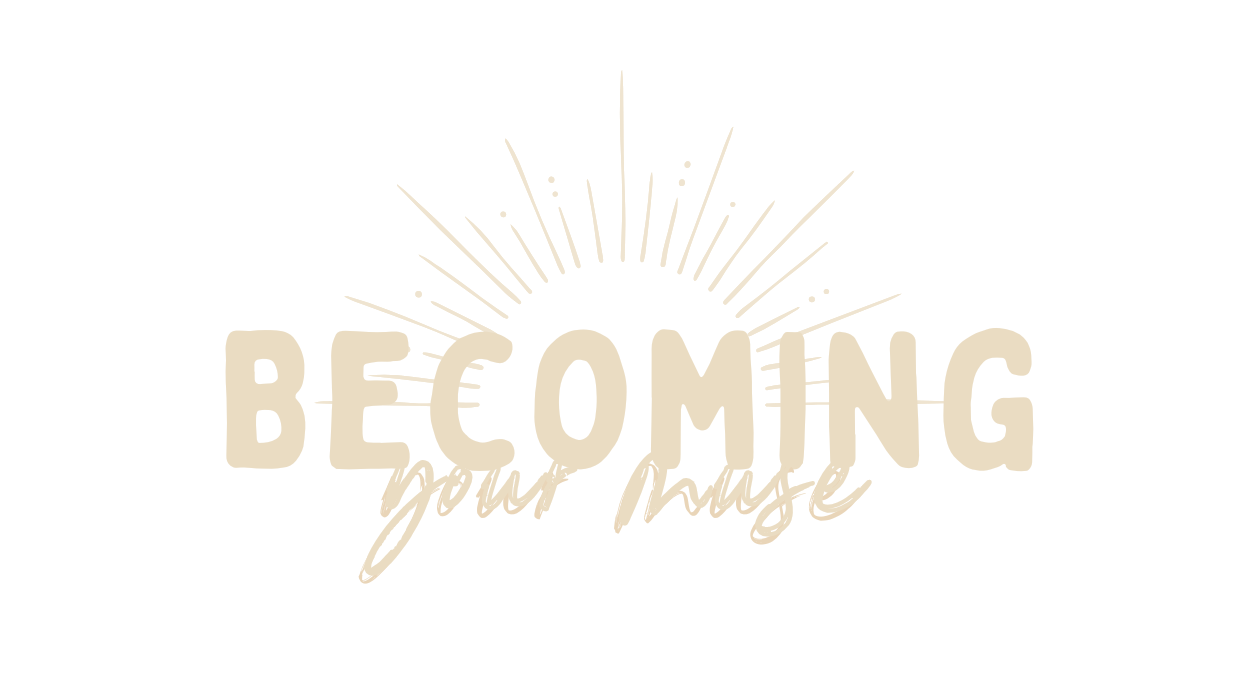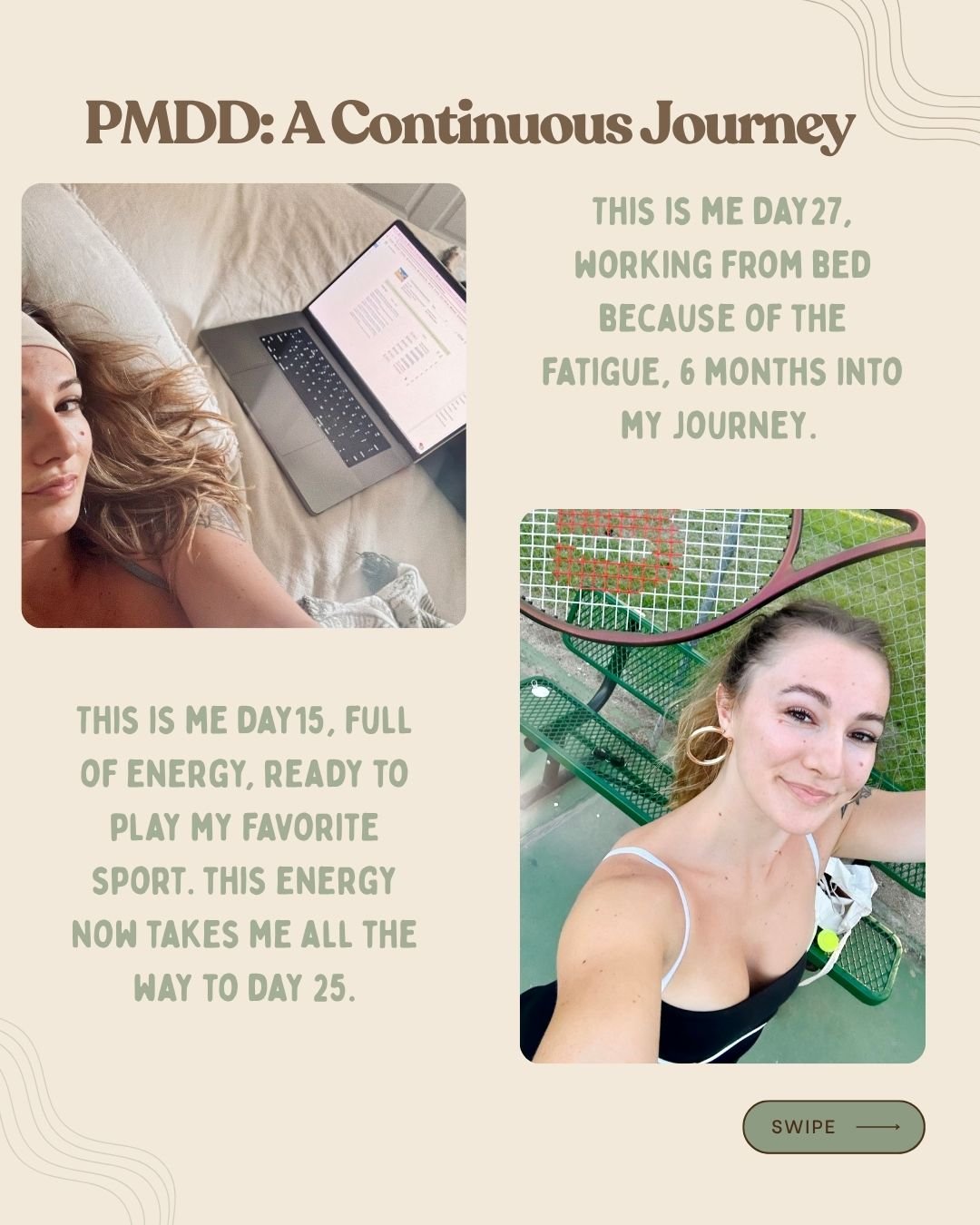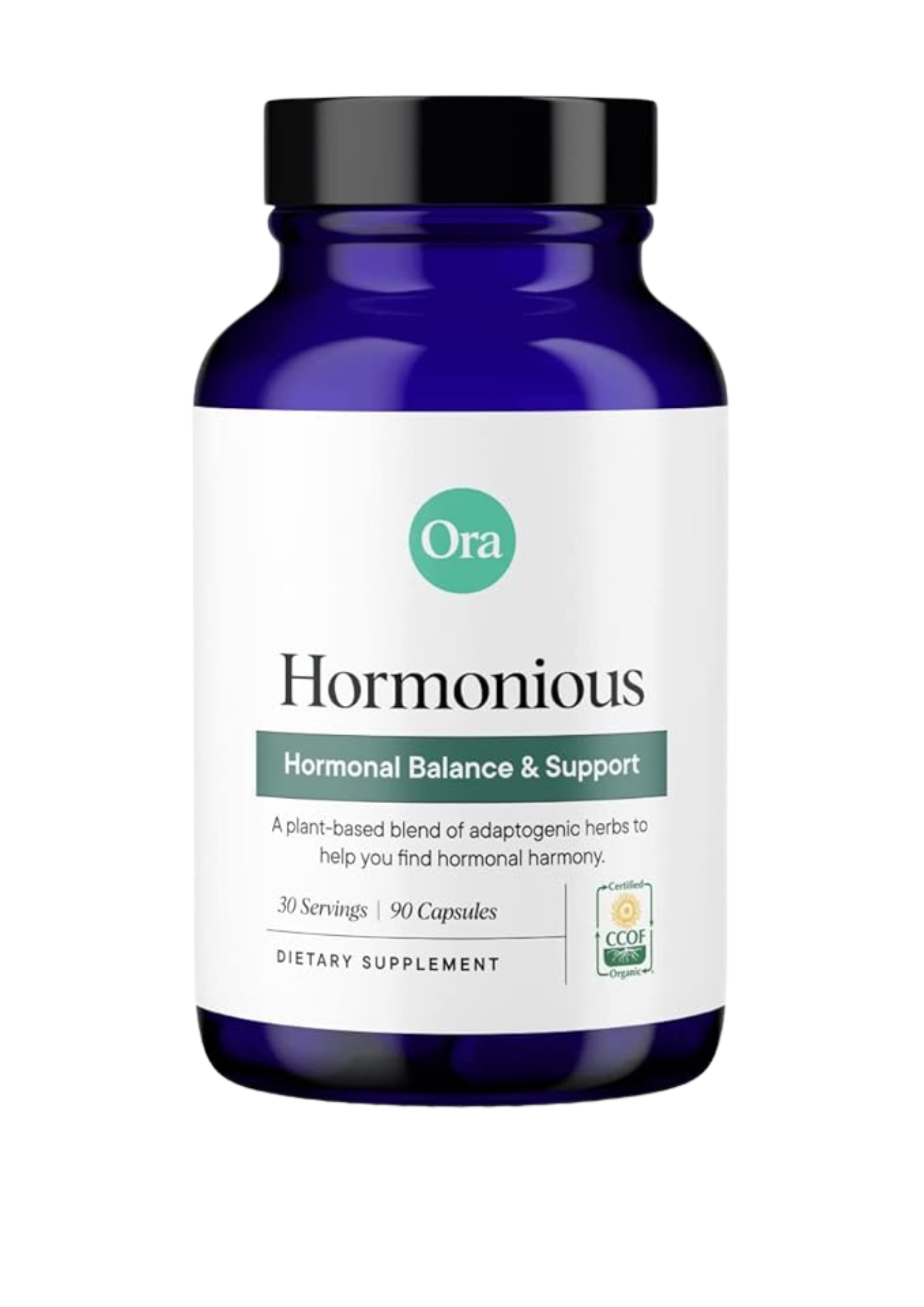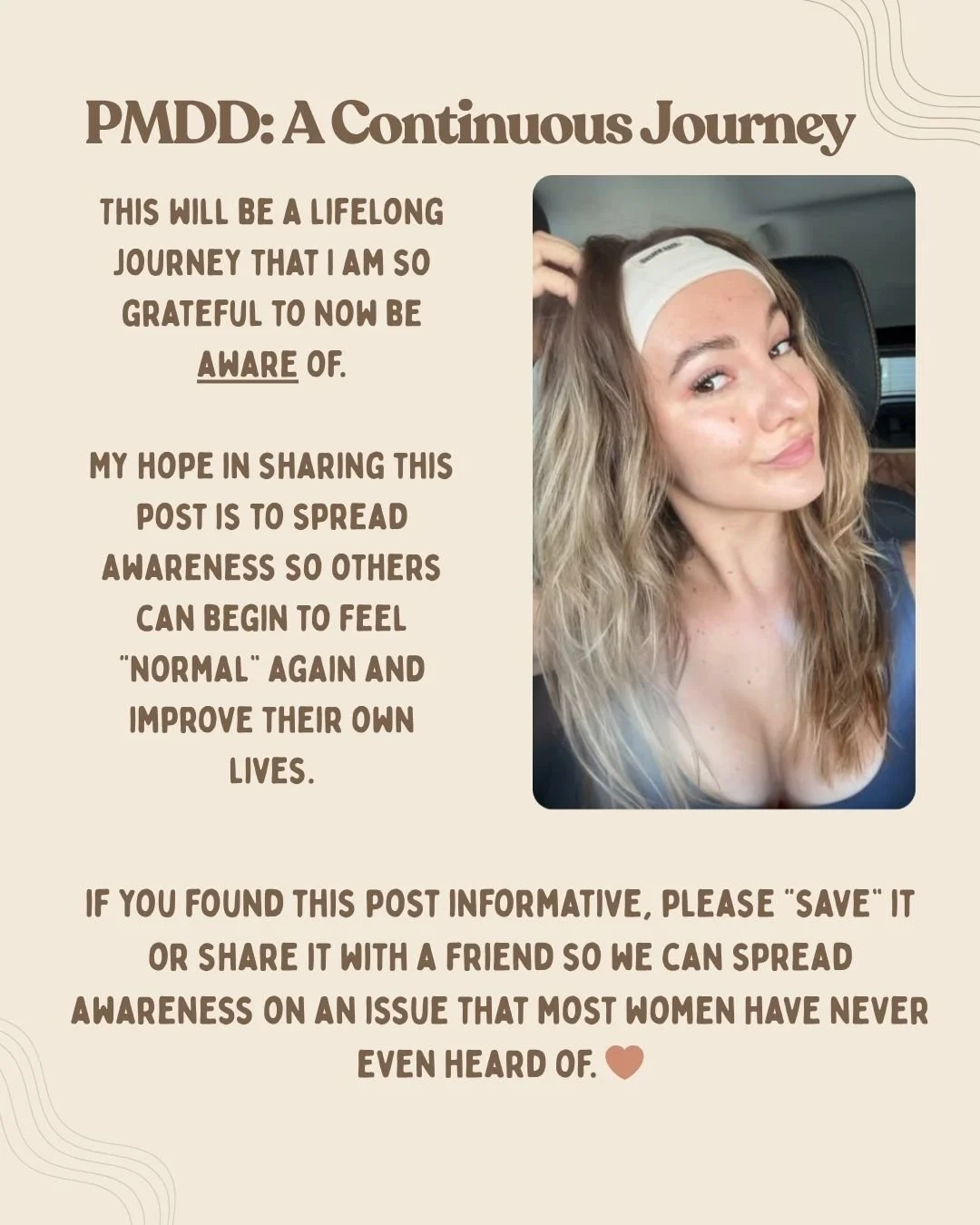PMDD & Me: How It Could Be Affecting You
First things first — What IS PMDD?
PMDD stands for Premenstrual Dysphoric Disorder, a severe hormone-related condition that affects people during the luteal phase of their menstrual cycle (the 1–2 weeks before their period).
The difference between PMS and PMDD comes down to severity. While PMS might bring some irritability or bloating, PMDD can cause symptoms so intense they disrupt your work, your relationships, and your sense of self.
Many people with PMDD describe feeling like a completely different person during this part of their cycle. (Which for someone with PMDD could last anywhere from 7-14 days of your cycle.)
Here are some of the most common symptoms of PMDD:
Sudden mood swings or intense sadness (sobbing)
Irritability and anger that can feel hard to control
Anxiety, panic, or emotional overwhelm from small tasks
Fatigue, brain fog, and difficulty concentrating
Sleep issues, appetite changes, and physical pain (like breast tenderness or bloating)
The Discovery: My First “Episode”
Earlier this year, I learned I have PMDD—and it was the missing puzzle piece I didn’t know I was searching for.
On New Year’s Eve, I had what I now call an “episode.” But the truth is, this wasn’t isolated. These moments had been happening more often—making me feel crazy, impacting my relationships, and making life feel dreadful. (But only for two weeks out of every month. 😅)
I began to fear my luteal phase. I didn’t know why, or what, but I knew something was wrong. One week I’d feel motivated and clear… the next, I’d be drowning in sadness, frustration, and disconnection, starting fights with the people around me or crying for “no reason”.
When Everything Started Making Sense..
When I finally learned about PMDD, it was like a weight had been taking off my shoulders. I wasn’t unstable. I wasn’t crazy. I wasn’t making it up. I was just unaware. Uneducated on something so many women are. Looking back, I’ve likely been struggling with PMDD for nearly a decade—but my deep love of holistic health and herbalism had me unintentionally managing it without knowing the root cause. I had praised herbs like Maca and Ashwagandha for years, not realizing they were partially treating (or masking) something I didn’t yet have a name for.
How It Showed Up For Me:
Before a 6-week trip through Europe, I stopped taking all supplements and herbs— I was taking a multitude, and I had begun to think maybe they weren’t doing anything, so it was the perfect time to take a break and see. When I returned home from Europe, about 8-10 weeks without any herbs, I felt low.
At first, I blamed it on reverse culture shock or dissatisfaction with my life back home. There was a stark contrast in my summer and my reality, and I thought surely that was to blame for my growing depression.
The weird thing is that sometimes things were fine, so fine that I would forget something was wrong. But things continued to get worse.
Each month, I felt my relationship and my mental health declining. I would forget about the emotional “episodes” as soon as my period started—because in my follicular phase, I felt fine again. My joy and clarity would return, and I’d move on like nothing happened.
But these episodes would accumulate, and it became harder and harder to feel like everything was okay.
This monthly amnesia is so common with PMDD—and it’s part of what makes it so hard to recognize, unless you know what you’re looking for.
6 Months Into Healing: What’s Helped Me.
Now that I know what I’m dealing with, I’m approaching my cycle with more care, compassion, and intention than ever before.
Here's what has helped me regulate my luteal phase and feel more like myself all month long:
1. Cutting Out Caffeine
Caffeine is a nervous system stimulant—not ideal for someone with PMDD. It can intensify anxiety, restlessness, and emotional sensitivity.
As someone who also experiences migraines, (see my post about migraine help here), this shift has helped in multiple ways. I now drink decaf espresso or matcha and have only noticed positive differences in my mood and energy.
2. Reducing Alcohol
Alcohol disrupts hormone balance, serotonin production, and blood sugar stability—all of which are already fragile in the luteal phase.
Alcohol can intensify:
Mood swings
Depression and anxiety
Irritability and emotional dysregulation
Cutting back has made a HUGE difference in my life.
3. Introducing Supportive Herbs
These are the staples I now rotate into my cycle support routine:
Maca Root: Naturally supports hormonal balance, including estrogen and cortisol regulation.
Vitex (Chaste Berry): Gently boosts progesterone and supports overall cycle regulation. Avoid if you’re on hormonal birth control, or talk to your doctor about the correct dose for you; even a small dose can help.
Ashwagandha: A calming adaptogen that helps modulate stress and support nervous system repair.
Magnesium Glycinate: Not technically an herb, but essential. Helps ease irritability, support sleep, and regulate blood sugar.
If you’re looking for premade blends, I love, and have used many times:
Ora Organic’s Hormonious 🌱
I took this for years, prior to my European excursion. I have recommended it to so many women for anything ranging from mood swings to hormonal acne. Ora's Hormonious blend offers natural support using organic adaptogens like maca, ashwagandha, and holy basil to nourish your adrenal system, skin, and mood.
My Honest Favorite for PMDD & Cycle Support 🌿
I’ve personally had the best results with Elix Cycle Balance - it’s an herbal formula rooted in Traditional Chinese Medicine that helps support hormones, mood, and overall cycle balance. If you’re navigating PMDD or just want a more grounded monthly rhythm, this is the blend I recommend again and again.
You can check it out here: Elix Cycle Balance
(affiliate link — no extra cost to you, ever)
PMDD and Trauma : The Connection
PMDD is believed to be a sensitivity to normal hormonal changes especially to the rise and fall of estrogen and progesterone in the luteal phase. The hormones themselves aren’t “wrong.” But your brain and body may respond to them differently if you’ve experienced trauma.
Here’s how trauma ties in:
1. Nervous System Dysregulation
People with a history of childhood trauma or chronic stress often have a nervous system that remains on high alert. So when hormone levels shift, your body might interpret those shifts as a threat—causing panic, sadness, or emotional flooding. Seemingly coming “out of nowhere”.
2. Estrogen and Serotonin
Estrogen supports serotonin, the “feel good” neurotransmitter. When estrogen drops before your period, serotonin drops too—and if your brain is already sensitive due to trauma, that drop can feel devastating.
3. Progesterone Sensitivity
While progesterone is calming for most people, in some trauma-wired brains, it activates anxiety and emotional distress instead of soothing it. This is why the luteal phase can feel unbearable for those with PMDD and a trauma background.
Final Thoughts:
You are not broken, you are not crazy, you were just unaware.
If this post sounds like your inner experience, please know this:
You are not “too sensitive.”
Your body is wise, even if it feels like it’s turning against you.
Understanding PMDD gave me my power back. It helped me name what I had been silently struggling with for years and begin showing up for myself in a new way.
Signing Off.
Whether you’re just discovering PMDD or you’ve known about it for a while, I hope this post reminds you that you are not alone and healing is possible.
Sending you all my healing energy,
✴ Aleca ✴
✴
✴
✴
DISCLOSURE: THIS POST MAY CONTAIN AFFILIATE LINKS, MEANING I GET A COMMISSION IF YOU DECIDE TO MAKE A PURCHASE THROUGH MY LINKS, AT NO COST TO YOU. PLEASE READ MY TERMS OF USE POLICY FOR MORE INFO.





